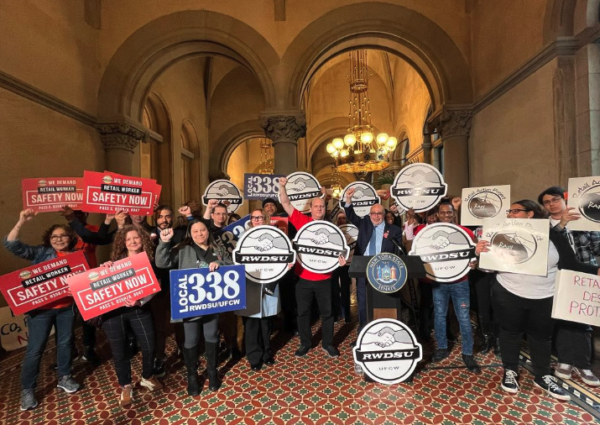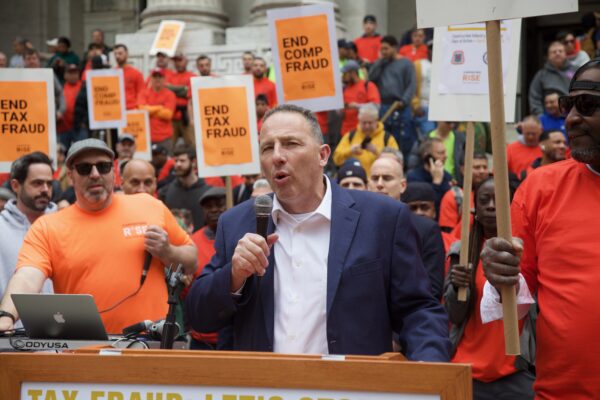February 4, 2014
By Steven Weiner
As Friends of Labor has described before on this blog, the unrelenting efforts by corporations (backed by some state governments) to decimate collective bargaining agreements and destroy unions have arisen because the successes of the American labor movement have cut into companies’ profits.
Ellen Reiss, Aesthetic Realism Chairman of Education, describes this victory in The Right of Aesthetic Realism to Be Known:
The greater justice for which [unions] fought, and which they increasingly achieved, has helped to disable profit economics. That’s why there has been such a fierce effort these decades to do away with unions in America, and why so many companies are having their work done overseas by “cheap” labor…
And she continues:
[T]he present difficulty of unions is really a sign of their strength: by the 1970s, unions were able to accomplish so much, get such a better life for American workers, that employers have found themselves unable to come away with the profits they desired. Unions, making work more ethical, have weakened a way of economics based on bad ethics. Seeing this fact should bring pride and encouragement to the American labor movement.
I, Steve Weiner, am thankful that my family was a direct beneficiary of that “greater justice” unions achieved for American workers and their families. My father worked hard, holding down two consecutive union jobs. As my brothers and I were growing up in Brooklyn in the ‘50s & ‘60s, our family was able to live comfortably on my father’s salary. Since his death, my mother receives his monthly pension.
And I, as a computer specialist (now retired) for a New York City agency, earned a decent salary, and today my retirement is secure—something that every working person has a right to have. However, vast numbers of America’s workers today have no such security, as the awful phrase “food insecurity” makes horribly and painfully clear. Working long hours for low pay—what often amounts to “starvation wages”—means that breadwinners cannot provide enough for their families, and all too many households feel they are one paycheck away from homelessness.
Meanwhile, the hardships inflicted on working men and women in recent years have made for something that has been brewing for a long time: people are more conscious and more outspoken, objecting fiercely to their labor being used to make profit for a few corporate executives and shareholders. The demonstrations by fast food workers clearly showed this. I despise profit economics and feel passionately that all workers should own their own jobs. “Labor,” Eli Siegel stated, “is the only source of wealth; there is no other source except land, the raw material.” It’s the labor of millions of working people that has made this country the richest in the world, and the wealth this nation produces rightfully belongs to the people who create it.
Recently, I was vividly reminded of how important unions are as I attended acinema lecture given by the Emmy award- winning filmmaker Ken Kimmelman. He has produced important, groundbreaking films for social justice: against racism, prejudice, and homelessness, including “The Heart Knows Better,” and “What Does a Person Deserve?” In a class entitled “Films Criticize the Profit Motive—or, Good Will vs. Ill Will,” Ken Kimmelman discussed the ethics of several films important in the field of social justice, including one many people respect, learned from, and love: “Norma Rae.”
Based on a true story, “Norma Rae” takes place in North Carolina in the 1960s and ‘70s. Crystal Lee Jordan, the inspiration for the title character, worked for a major textile manufacturer, the J.P. Stevens Company. From the time the textile industry began moving out of the North in the 1880s into the deep South, it was notorious for having some of the worst working conditions. As the movie begins, we witness some of the awful environment that Norma Rae and her fellow employees are forced to endure, resulting, for example, in her mother’s deafness from the screaming blare of the textile machinery. She objects, but to no avail. Alone, she is powerless. But then she hears a union organizer describe the benefits of unionization; she listens intently, and works courageously to unionize her fellow factory workers, meeting intense and frightening opposition from management, including being jailed and later fired. In his talk, Ken Kimmelman quoted Sally Fields, the actress who superbly portrayed Norma Rae: “You live there and you become one of them…. You learn to appreciate how difficult their lives are—and chances are you’re never getting out.”
In the end, after an intense and determined campaign, the union drive prevails, and the highlight of the movie, the final scene, is one of the most dramatic and iconic in American cinema. As Norma Rae is being escorted out of the mill, she quickly writes out the word “UNION” on a piece of cardboard, stands on a work table, and slowly turns around for all her co-workers to see. One by one, each worker stops their machine! I remembered this image, and was glad to know more why I was so moved. Ken Kimmelman explained, “The way the scene goes from motion and the ear-deafening whirr of the machinery to silence represents the power and unity of the workers. And during most of the scene, we look up at Norma Rae, which represents the admiration her co-workers—and we—have for her.”
This film stands for the courage, determination, and pride that’s in people today who are fighting for their right to live decently, and who see their cause as the cause of all workers.
Ellen Reiss explains in The Right Of:
What the American people need to be told clearly is who, or what, is really to blame for America’s economic suffering, job losses, government deficits. They’re being told unions are to blame, because unions have been able to negotiate for their members some of what all people deserve, including pensions and health care. If unions thrive, all Americans can have these, and more. Unions stand for all of us.
YES!



